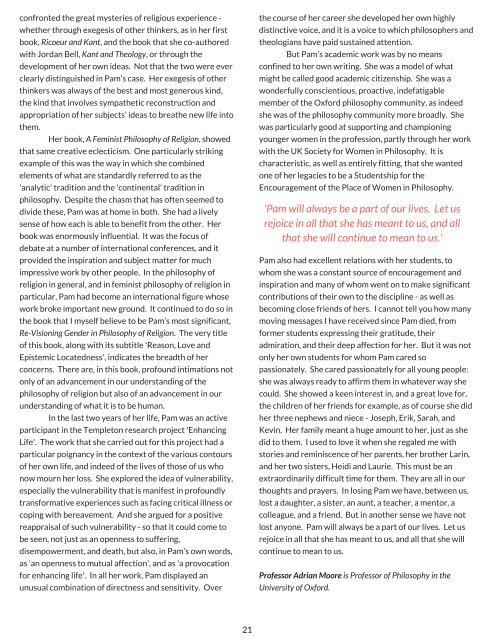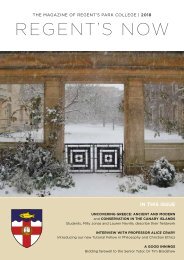RN17
You also want an ePaper? Increase the reach of your titles
YUMPU automatically turns print PDFs into web optimized ePapers that Google loves.
confronted the great mysteries of religious experience -<br />
whether through exegesis of other thinkers, as in her first<br />
book, Ricoeur and Kant, and the book that she co-authored<br />
with Jordan Bell, Kant and Theology, or through the<br />
development of her own ideas. Not that the two were ever<br />
clearly distinguished in Pam’s case. Her exegesis of other<br />
thinkers was always of the best and most generous kind,<br />
the kind that involves sympathetic reconstruction and<br />
appropriation of her subjects’ ideas to breathe new life into<br />
them.<br />
Her book, A Feminist Philosophy of Religion, showed<br />
that same creative eclecticism. One particularly striking<br />
example of this was the way in which she combined<br />
elements of what are standardly referred to as the<br />
'analytic' tradition and the 'continental' tradition in<br />
philosophy. Despite the chasm that has often seemed to<br />
divide these, Pam was at home in both. She had a lively<br />
sense of how each is able to benefit from the other. Her<br />
book was enormously influential. It was the focus of<br />
debate at a number of international conferences, and it<br />
provided the inspiration and subject matter for much<br />
impressive work by other people. In the philosophy of<br />
religion in general, and in feminist philosophy of religion in<br />
particular, Pam had become an international figure whose<br />
work broke important new ground. It continued to do so in<br />
the book that I myself believe to be Pam’s most significant,<br />
Re-Visioning Gender in Philosophy of Religion. The very title<br />
of this book, along with its subtitle 'Reason, Love and<br />
Epistemic Locatedness', indicates the breadth of her<br />
concerns. There are, in this book, profound intimations not<br />
only of an advancement in our understanding of the<br />
philosophy of religion but also of an advancement in our<br />
understanding of what it is to be human.<br />
In the last two years of her life, Pam was an active<br />
participant in the Templeton research project 'Enhancing<br />
Life'. The work that she carried out for this project had a<br />
particular poignancy in the context of the various contours<br />
of her own life, and indeed of the lives of those of us who<br />
now mourn her loss. She explored the idea of vulnerability,<br />
especially the vulnerability that is manifest in profoundly<br />
transformative experiences such as facing critical illness or<br />
coping with bereavement. And she argued for a positive<br />
reappraisal of such vulnerability - so that it could come to<br />
be seen, not just as an openness to suffering,<br />
disempowerment, and death, but also, in Pam’s own words,<br />
as 'an openness to mutual affection', and as 'a provocation<br />
for enhancing life'. In all her work, Pam displayed an<br />
unusual combination of directness and sensitivity. Over<br />
the course of her career she developed her own highly<br />
distinctive voice, and it is a voice to which philosophers and<br />
theologians have paid sustained attention.<br />
But Pam’s academic work was by no means<br />
confined to her own writing. She was a model of what<br />
might be called good academic citizenship. She was a<br />
wonderfully conscientious, proactive, indefatigable<br />
member of the Oxford philosophy community, as indeed<br />
she was of the philosophy community more broadly. She<br />
was particularly good at supporting and championing<br />
younger women in the profession, partly through her work<br />
with the UK Society for Women in Philosophy. It is<br />
characteristic, as well as entirely fitting, that she wanted<br />
one of her legacies to be a Studentship for the<br />
Encouragement of the Place of Women in Philosophy.<br />
'Pam will always be a part of our lives. Let us<br />
rejoice in all that she has meant to us, and all<br />
that she will continue to mean to us.'<br />
Pam also had excellent relations with her students, to<br />
whom she was a constant source of encouragement and<br />
inspiration and many of whom went on to make significant<br />
contributions of their own to the discipline - as well as<br />
becoming close friends of hers. I cannot tell you how many<br />
moving messages I have received since Pam died, from<br />
former students expressing their gratitude, their<br />
admiration, and their deep affection for her. But it was not<br />
only her own students for whom Pam cared so<br />
passionately. She cared passionately for all young people:<br />
she was always ready to affirm them in whatever way she<br />
could. She showed a keen interest in, and a great love for,<br />
the children of her friends for example, as of course she did<br />
her three nephews and niece - Joseph, Erik, Sarah, and<br />
Kevin. Her family meant a huge amount to her, just as she<br />
did to them. I used to love it when she regaled me with<br />
stories and reminiscence of her parents, her brother Larin,<br />
and her two sisters, Heidi and Laurie. This must be an<br />
extraordinarily difficult time for them. They are all in our<br />
thoughts and prayers. In losing Pam we have, between us,<br />
lost a daughter, a sister, an aunt, a teacher, a mentor, a<br />
colleague, and a friend. But in another sense we have not<br />
lost anyone. Pam will always be a part of our lives. Let us<br />
rejoice in all that she has meant to us, and all that she will<br />
continue to mean to us.<br />
Professor Adrian Moore is Professor of Philosophy in the<br />
University of Oxford.<br />
21





